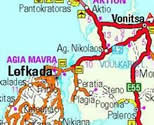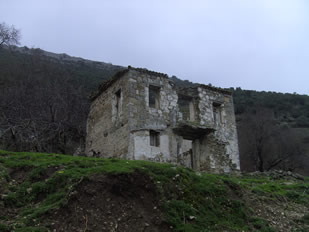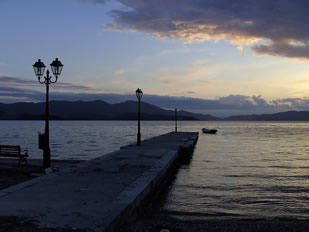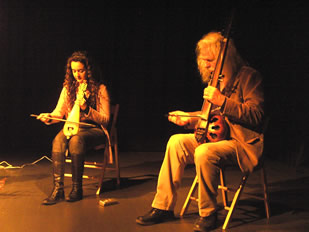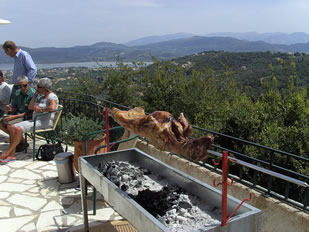
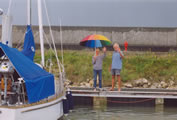
Back to the general overview, click here
Our English Pages (5.2)
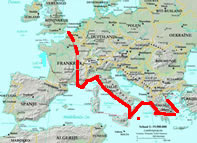 |
4. Greece 1.2. Wintering at Lefkas,explorations, discoveries and rediscoveries2008-2009 |
Overview and harbours, click here.
Winter in Lefkas Marina
13.11.08 Lefkas Marina. Still nice weather since our return to Lefkas. Temperature at midday about 20 degrees C.
09.12.08 Lefkas Marina. But the nice weather doesn't remain! Thunderstorms, rain and heavy wind: this is our daily weather. So, our first wintering in Greece, starts not so successful.
Our cockpit hood is now protecting us and gives double live space: on this "terrace" we have our breakfast and our lunch, it's also our "reading lounge" where it's particularly nice remaining when ... it's sunny! In the evening we join for dinner restaurant Fairytale - Paramythi - where the logs of oliver wood are slowly burning in the fireplace. Our laptop has found his place on the cabin table and our mainsail, stowed under the same table, is waiting for spring ...
Time now for some explorations but also for real statements and those seem us not always positive.
We are still amazed about the weather conditions - and we are not alone, people here are surprised too. With a disconcerting regularity the perturbations with heavy thunderstorms and stormy winds, are crossing through the Mediterranean Sea from west to east. In an average time of 36 hours the bad weather of the Golfe du Lion reaches Lefkas. So this night from Wednesday to Thursday. According the forecast the wind was rapidly increasing: in no time to 34 knots from the SE and the thunderstorm was breaking out. At 06.00 a.m. the wind was blowing 40 knots and it was heavily raining. At 10 a.m. we had a short bright interval and then the wind reached an average of 44 knots; gusts over 50 knots were pushing little waves over the pontoons. the whole night the marina staff was stand-by and until late in the afternoon with six or seven they remain mobilized. Then the wind had veered to the west and was easing, falling in the evening and following the perturbation to the NE of the Balkans..
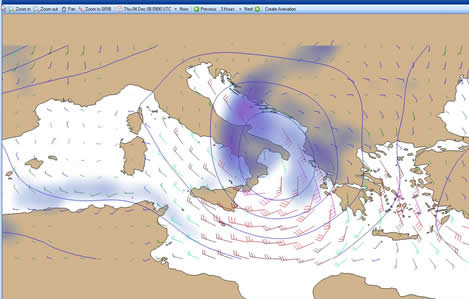 |
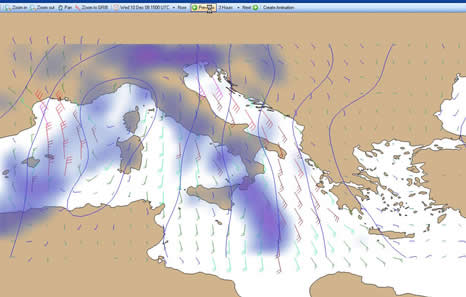 |
| Bad weather, UGRIB for the 4th of December 2008 09H00 UTC |
Bad weather forecasted for Lefkas on Thursday and Friday,
UGRIB for the 10th of December 2008 15H00 UTC. |
Now we enjoy three days of nice, sunny weather - so staying in our cockpit is particularly pleasant! -, but the evenings and nights are cool - or is the winter cold already there? - ... till the next depression arrives ...
The riots after the death of a 15 years old boy, shot down by the police at Athens and the chaos at many places, like Thessaloniki and Patras, Trikala and Larissa - also at Corfu - are also touching peaceful Lefkas: students and pupils are demonstrating on the police office and give free expression to their anger. Eggs thrown to the front, slogans painted on the road, vehicles of the police set on. Increased by this tragic event the discontent opposite the government of centre-right, renewed last year, but eroded by many scandals, is spreading in the whole country; the anxiety due the economic crisis is exciting reactions with on the background growing social uneasiness and financial problems, in this country where heavy political protest is part of the tradition; tomorrow a 24 hours strike will keep the country in a grip.
We too, in our little world of "cruising-navigators-winterers" and keeping all proportions in mind, are thinking that in Greece many things are not going the right way! If it's so that budget was established with a prognosis of a growth of 2,7% GDP ( GDP= gross domestic products, Athens Plus, Nr 25, November 28, 2008, p.5, Government will be hard pressed to meet targets; Greece has history of missing economic forecasts), in which tourism should be one of the two most important factors, then we think that this must involve a more consequent politic:
" Greece misses boat on sailing " ... but not only that: " Martyrs and waste ... " (in weekly newspapers Athens Plus and Athens News)
Rubbish, bad situated and illegal waste belts, roads in poor condition, endless public works, defective or unfinished infrastructures, irritating mass tourism, defective equipment for cruising people-on-the-way, many new harbours, for a large part built with E. U. subsidies, without management, unfinished and with poor - or without - equipment and facilities, exception made for the sparse, but good, marina. ... it seems that in this country there is no planning, no follow-up, no efficiency. Absence of the authorities in one of the most bureaucratic countries of Europe, or incompetence of these authorities? The individuals living on tourism, yes, they know how to do. They do things with care, there it's pleasant, nice and clean. Fifty meters further on, it looks like a shanty town.
Lefkas should be only a small island, Lefkada only a little town without many means? It should be like this only in Ionian Greece ...
We don't want to believe these affirmations like that: in very little time our attitude to Greece has changed. Big sympathy, big irritation. Doing not, not being able, knowing not, wanting not?
Litter .. . The window of the car opened, the empty cigarette box landing on the road: we have seen this not one time, but hundred times, thousand times! Along the road from Lefkas to Preveza the rubbish indicating the limit of the road: the last picture before our fly to Belgium, the first picture when we came back to Lefkas.
Overloaded rubbish containers. The main shopping street at Lefkada, 9 p.m. Dustbins and rubbish bags, packaging refuse are waiting for the dust truck. When we return to the marina at about 11 p.m., the dustmen have been there, the rubbish has disappeared ... partly! Out of the torn bags a part of the rubbish landed on the road. Parcels of packaging expandable polystyrene (EPS) are flying by the wind. Yes, it will be the wind that will clean up the street because road sweepers are not working here.
It's better not to be here if you are an handicapped person or if you are walking with a pram, or if you are old and your mobility is reduced: cars are parked anywhere and carelessly, the pavements are hampered by all kind of obstacles - the little 24 hours police station near the police office forces you to find your way, on the roadway, between the parked cars.
Lefkas Marina. One of the scarce marinas in Greece, recent and well equipped - centred on the charter boats and flotillas - still more numerous - from a large number of companies, for a large part, from abroad. The marina staff is friendly and very active, stand by in all weather and giving a feeling of security. The marina has been recently enlarged with some pontoons, although unfortunately the number of toilet and shower blocks has not been increased. And if all showers should operate well, it should be a luxury: after three months, the spares are still not delivered.
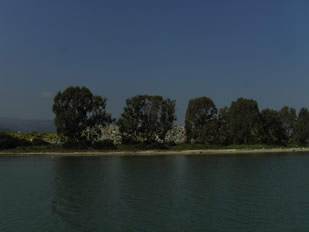 |
At 500 meters south of the Marina, along the right bank of Lefkas Canal (!) there is a large rubbish dump! The trucks - much more in season - are coming and going to discharge rubbish, bulldozers are working. Such an absurdity, we couldn't even imagine it - in our sympathy, at that moment still very naive! Now we are asking if this is the consequence of the incompetence of a bureaucratic authority, of the consequence of the contempt for the to numerous foreign visitors of the marina, or the consequence of an unspeakable and uncontrolled stupidity! ( click here and here to enlarge the pictures ) | 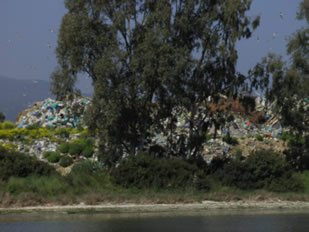 |
And then we read in Athens News (Nr 13313, 14-20 November 2008, p.13) that there are in Greece more than 1000 illegal waste belts; the " nec plus ultra " is the Hill of 40 Martyrs, at Arkanes (N-W Attica). The European Union has imposed a penalty payment of 34000 euro pro day for each belt not cleaned up, from 2009. We wonder to see what really will happen! In the meantime new touristic settlements - new parts of the coast! - are granted by the Minister of Tourism to property developers - despite negative opinions of experts of construction planning (Athens News, o.c., p.3 ). Can we ask too how treatment of increasing rubbish will be, or is this no matter of concern ? Perhaps the example of the island Samothraki will be followed, where since one month rubbish is not collected and where the prefectural authorities have asked the government to declare the state of emergency (Athens Plus, Nr 24, 21 november 2008, p. 7)?
More and more questions are arising concerning the by the European Union hardly financed harbours and new marinas( on average > 75% ). In a letter published by Athens Plus (o.c., p. 11 ) - Greece misses boat on sailing - the question about what happened with the " 13 billion euros " which Greece has got during the last 10-13 years, is very judiciously asked; we can add this little provisional list, established on the information we got by email from friends who have their boat in Greece or who were cruising this year, and completed by our own still limited experience. A list of the non-finished marinas - still under construction! - is to be consulted - what an irony, what a sarcasm - on the website of the GNTO, the Greek touristic service ( see our " Links " ): Mourtos-Sivota: the new port basin is nearly terminated but future equipment and management are problematic, actually no water no electricity, no facilities, exception made for three temporary toilet-cabins, rumours of sale or concession; Preveza: the shell of the marina is finished since some years, no management, space is monopolised by hire companies and (foreign) longstayers, little or no access to water supply, no electricity, no facilities; Missilonghi (E.U.: 161 million euros, see board!): only the quay and the pontoons exist - two without landing possibility (!), no water no electricity; Itea, large and nice harbour with E.U. flag ... but no water no electricity, no access to the new built facility block with shower and toilet, used as lumber room (" the new building with bath and toilet was used for storing old carpets, etc." ); Korinthos: marina less berths and crowded with small local fishing boats " filled with small fishing boats "; at the island Chios, a new marina is finished, but not in use -closed - as the information we got it will not be opened ... because this island is rich enough as was said so they should avoid tourism!
From love to hate there is only one step and it's more easy to burn what you loved: so speaks the popular wisdom. After traveling in Greece more than twenty - since 1975/76 - by car crossing the country, by ferry boat to many island - earlier with our surfboards and our Zodiac -, from Alexandroupoli in the east to Igoumenitsa in the west, from Thessaloniki in the north to Githion in the south of the Peloponissos, from the island Thassos to Crete, from Corfu to Lesbos -, but, now coming back with our sailing boat - a project cherished since a long time -, the disappointment is very big.
This country has changed. One foot in the 21th century, the other in the beginning of the 20th. Press and books are telling it. Constraints and problems came with the modernity but the solutions didn't follow, or less. This country is ill, ill by the archaic structures, by the poor management structures ... When we are speaking about it, many Greeks shrug the shoulders disillusioned τι θα κανουμε; - ti tha kanoume? what can we do? Hope that things change, no, they say, because ... this is Greece. A minority - foreigners too - progress, get richer, the majority, not. The young people, who just have finished studies, desperately looking for work - even for a five hundred euro job -, the father who's going to his second or third underpaid job - trying to support his children, engaged in a complicate and old-fashioned school career or remaining for a to long time at home due to the lack of prospect -, the woman, to many times out of work and the priority victim of redundancy, the old people or the sick person getting less of good treatment and having to live with inadequate resources ... This country is ill, the dissatisfaction is everywhere, anxiety is brewing, the anger too, and, then, suddenly the revolt breaks out, like now ...But of what future will be made?
Back to the environment. The Greek, of various political opinion, we are speaking with, understand our judgment, our reaction, but they ask also understanding and patience. According their opinion, this all is due to the present government, or to the previous, or still to the incompetence of the politicians of all parties - a judgment that we find also in many foreign newspapers-, or to immigration - no-Greeks should cause the problems, well ... where have we heard that assertion too? If there is a cultural factor - in our opinion this is not to deny: the Greek seem not very sensible for ecologic problems although there are very active ecologists in Greece -, increasing of mass tourism, despite all, has confronted this country with a increasing of problems for which there is no serious and responsible political vision about management. Although Greece is certainly not the only European country that is living beyond its means "about the capacity of reconstitute its natural resources ", Greece scores very worrying due to its vulnerable geography; so the recurrent absence of sanitation of waste water subjects this vulnerable environment to an important pressure ( cfr. Planète, pages 4/5, daily and fascinating , in Le Monde, November 2008 - 14 Nov. 08, p.5: " La pression de l'homme sur la biosphère a doublé en 40 ans. L'humanité vit à crédit: l'activité humaine dégrade les écosystèmes plus rapidement que ceux-ci ne peuvent se reconstituer avertit WWF dans son rapport annuel intitulé Planète vivante; l'empreinte écologique mesure les surfaces biologiquement productives de terre et d'eau nécessaires pour produire les ressources qu'un pays consomme et pour absorber les déchets qu'il génère; empreinte écologique 100% <Grèce <150% -, and in the same newspaper on 26th of July 2008, p.7 )
Ignoring these problems and closing the eyes dazzled by the blue sea and the summer sun, and thus being blind for the reality, would be irresponsible. Greece benefits, for a wide part, of the manna of the European subsidies, but gives not really the assurance of its capacity of wanting to evolve, with the made available means, to appropriated solutions and answers.
The Petit Larousse dictionary - not at all a controversial work, an extension information and data base for the wide public - notes in its edition 2008, at the article "Greece": "Le déficit considérable de la balance commerciale est plus ou moins comblé par les revenus de la flotte marchande, les envois des émigrés et par le tourisme. Mais l'endettement est lourd et le sous-emploi est important. Enfin l'économie parallèle représente une part notable du PIB ( entre 25 et 30 % )." [ The important deficit of the commercial balance is more or less made up by the income of the merchant fleet, remittances by emigrants and by tourism. But the debt is heavy and under-employment important. Finally the unofficial economy represents a significant share of GDP ( between 25 and 30% ).]
So big work for competent politicians and ... for the control committees of the European Union! Now at this time of severe world crisis, the Greek - and the Greece lovers! - should have right to hope ... ( flw)
10.12.08 Lefkas Marina.
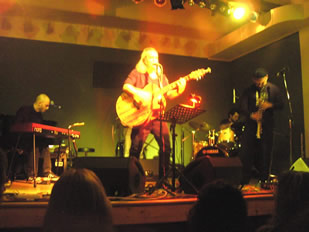 |
Yesterday evening we have seen the concert of Christos Thivaios at the artistic and cultural centre Artiria, situated in the marina. In the full hall, the mostly young spectators were reacting with much enthusiasm to the varied performance, at times very rock and jazzy. Christos Thivaios and his four musicians have brought many of their here well-known songs, so that rapidly the audience was singing and replying. Applauding, clapping and stamping the spectators have demanded many bis-songs; so, it was very late when the lights were switched off... At "Artiria" ( www.artiria.gr ), there are many activities and events but mostly for a Greek speaking audience. Some weeks ago, just back at Lefkas, we had the opportunity to assist at the last performance of the 3th Week of the French film, Hors de prix, a light comedy with Audrey Tautou and next week four films by John Cassavetes will be shown: good real opportunities in a country where the linguistic barrel is a real integration problem. So many times it's impossible for us to assist at some - with no doubt - very interesting: listen to the talk, in Greek, of a writer about his last book or his work has no sense for us. Such experience forces us to think about integration and communication in a much wider context ... |
Jacky, the marina manager's wife, organises very useful gym lessons - in English - followed in majority by the ladies of the wintering community and also by in Lefkas permanent living, English speaking people; Kaat has decided to join them and is not missing one session. In the little library of the " community room " - where we only go with a certain reserve - , disposal by the marina, we have found, lost in the abundance of English books, some Dutch, French and German novels. At the Municipal library we have more choice, but the most terrible chaos is reigning in this shelf. Kaat has proposed to try to bring some clarity in it.
Although we distrust general judgments about people or individuals, conscious as we are about their relative character and their load of prejudices - sophisms are then not far away -, we take the risk to say this: in personal contact the Greeks seems to be kind and obliging, concerned not to hurt or to disturb, but our opinion is quite different about the Greeks in the anonymous masses!. Persona experiences temperate without any doubt our global not so positive opinion. Irritant when they are pushing you talking to somebody or looking elsewhere, irritant when they are going to catch their feet in you pc cable at the internet cafe, without any regard for what you are doing and giving no attention to your sign to be careful. Irritant when they are near to knock down you on a pedestrian crossing because in their opinion their car has always priority. Irritant when they are smoking cigarette after cigarette in the restaurant, smoking while they are eating, always two or three boxes in reserve - here is no interdiction, no anti-smoke campaigns-; so we go earlier to the restaurant and leave when the Greeks are starting to smoke out each other while they are eating, fortunately, a little bit later ...
Today general strike in Greece. The unions have found each other in their protest against the centre-right government of Kostas Karamanlis, the opposition, with the Pasok leading in the polls, demand the resignation of the government and new elections. The explosion of anger after the death of the 15 years old adolescent isn't falling and the press - also from abroad - underlines that the government is loosing the control of the situation. Our little television on board allows us to follow the riots, getting mainly in Athens, guerilla forms. Burned cars, waste containers on fire, fronts blackened by smoke, plundered shops, charges of the anti-riot police, countercharges by the demonstrators armed with steel bars, throwing stones and incendiary cocktails ...
At Lefkas, exception made for some new little demonstrations in front of the police office, an apparent quietness is reigning. Today too the watchwords of the strike are widely followed, as long as we can appreciate: services of the municipality are closed, and also the post office, schools are on strike. We'll not get our newspaper Le Monde, that we daily buy from the bookseller and that we put after reading at the community room ... where it never remains for a long time!
20.12.08 Lefkas Marina.
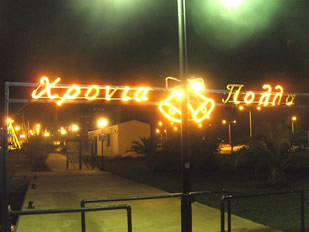 |
The sun is back, for some days. If we can believe the forecast it will be sunny, dry but a little cold - about 12 degrees C at midday - and a little windy from the north - 29 knots on Sunday - till after Christmas. After this horrible week of endless rain, thunderstorms and heavy southerly wind, this is a real relief! The whole little town is now decorated with Christmas lights, all the shops and many houses too. In the marina also lights, lanterns and coloured garlands have been put on, as well as on a lot of boats. Like last year, a Christmas lights garland and a illuminated mini-tree bring a nice atmosphere in our cockpit; and, like last year, at this winter solstice, we are waiting for the moment that days become longer, hope for a still far-off spring and a nice summer. The marina has not forgotten the wintering community: so the harbormaster has not only brought us two bottles of wine but the management also has kept its promise - in no time in two shower blocks well working heathers were installed! |
06.01.09 Lefkas Marina. The celebration of the Epiphany is closing the festive period. The popes have fulfilled the blessing rituals, and, true to tradition to prove courage, young men have braved the cold waters in the harbour by recovering the thron oranges. Like every year Lefkas has honoured the tradition with fanfare and people's participation.
Nice weather today after the never ending procession of raining days "embellished" by thunderstorms and winds; the summits now are shining in the sun and, enticing, they seem to invite us. We are planning a few trips into the mainland, to the Meteora, near Kalambaka - should our hotel Romantica of 1980 and 1991 exist? - and perhaps to Metsovon, but also to Trikala and Ioanina, places where we often passed in summer but always without making a stop, and an re-exploration to the Pilion - and Horto - are on our plans too. But first on we want to see how the weather is evolving. At the Côte d'Azur too, the winter is less mild than last year. So, before making too precise plans, we stick to a wait and see.
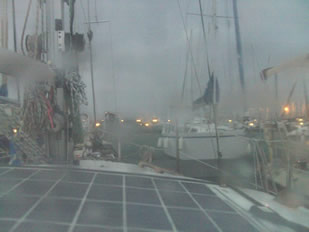 |
long time - despite this marina is well kept and secure, when the winter is serving us a cocktail of wind and bad weather, a little bit to strong and heady for our taste! Involuntarily we see in it, already, the signs of the change of climate - in this opinion confirmed by the lecture of our newspapers - although from a prudent realistic point of view the deadlines are despite all a little to short - even in the most pessimist ...although ...! At restaurant San Paramythi they have prepared for us excellent grandmothers keftedakia - sauce of fresh tomato's and feta cheese -, absolute gluten-free; for hors-d'oeuvre, tsaziki - yoghurt, cucumbers and garlic - and a salad Paramythi - curly lettuce, thin slices of green apples, walnuts, sauce of yoghurt |
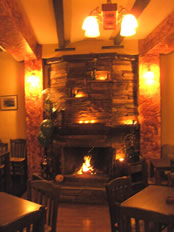 |
and honey -; with an ouzo and a little, local, red wine, this all will constitute a real good meal! The strong walk of this afternoon, around the laguna - about six kilometres between see and ponds, in company of wintering flamingo's, pelicans, white herons, moorhens, cormorants and ducks - had well stimulated our appetite!
Our new winter exploration of the island and of the little part of the adjacent continental Greece.
14.01.09 Lefkas Marina. Kaat tells the story ...
Last Thursday we went to the hospital of Lefkas ... or a leap in the past of fifty years ago! Eric had to go there for a quarterly routine phlebotomy due to his iron-overload problem. He was well seen by a young helpful doctor and a cheerful nurse but we were really dismayed about the state of the hospital: in such a state of defacing, with no doubt it would be closed in Belgium. This experience has still reinforced our opinion about the public services and the health care in Greece, and has confirmed what we recently red: on this matter too, work is not missing!
Heavy precipitations and S-ly winds till 33 knots, the bad weather is holding us on board. Despite still little confused and untidy thinking about our cruising projects and the next wintering, we have started our new exploration of the island and of the little part of the adjacent continental Greece.
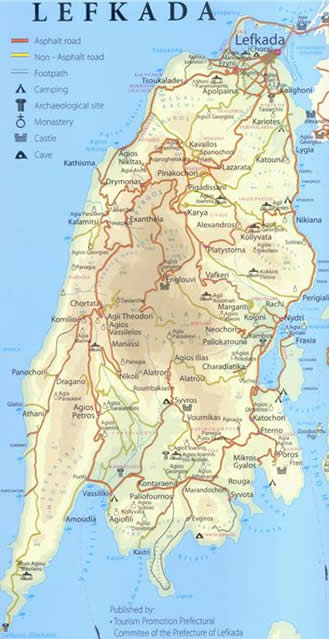 |
With the car we rented for one month we went the day before yesterday to Vasiliki on the south coast. We started the little trip on the west coast at the nice little village of Aghios Nikitas - rather deserted in this season -, then we went up to Kalamitsi - happy to find again the Greece we knew before. When we made a stop at Kathisma beach we found out that at this place, still rather preserved in 1989 - at that time there was only one tavern -, now is occupied by many constructions, from hotel to disco - deserted in the winter. Between Kalamitsi and Aghios Petros suddenly we found the road blocked ... by a dunkey. No owner in sight, so I took him to the side of the road. He followed me docilely and we could follow our trip to Vasiliki. Easily we found Toula's house where we stayed with Olivier in 1986, situated little further on, in front of the service station. On a day in 1986, we saw high flames during a fuel delivery but fortunately the fire was extinguished in time. A catastrophe had been avoided ... Now Toula wasn't there - at that time too she spent the winters with her family in Athens. Along the path from Toula's house to the beach nearby, now many houses with studio's for rent were built. On this winter day, we found in the harbour only a few little fishing boats and two bigger trip boats waiting for the summer fever. By the south and the east coast we went back to the north. Our visit to Amousso beach and Sivota is for an other time. We saw Vliho and Nidri only from the sea this summer - we didn't find nothing charming here - but now, seen from the road, in the darkness of the falling night, it couldn't give us a better impression: untidy, rather dirty and unfinished. We really do not envy at all the wintering boat people!
|
[maps: Tourism Promotion Prefectural Comitee of the Prefecture of Lefkada & GNTO]
chaotic along a long sandy beach, till Paleros, a village about which we'll refrain from giving any comment.
At that moment it was so heavily raining that we decide to reach Vonitsa. There we got a nice surprise: the little town has tripled, but the harbour and the quay are a nice and finished unity,what it wasn't at all in our souvenirs of ... 1980! In this little harbour of the Preveza inland see, all in all in fact not so well protected, one occupied sailing boat, lonely and brave, with the UK Red Ensign, was pulling on his mooring lines. From Vonitsa we returned to Lefkada, taking the main road where we detected some signs of cleaning up since our passage in November ... or was it the work of the rain and the wind?
25.01.09 Lefkas Marina. Eric tells the story...
The weather wasn't really nice, and although showers, drizzle or strong winds are not far, we take advantage of this better days to continue our re-exploration of the island. Our trips bring us mostly to very nice places: the little villages have found again their authenticity now the many occupants have made the choice to spend the winter in larger centres, preferring the liveliness of towns to a lonely life, the beaches now are deserted ... the nature has taken back her rights and an almost unknown silence, nearly audible is reigning. . But the storms have left traces: on the roads, mostly good, - they are all covered - here a little failure is visible, there little rocks, stones or mud require all drivers attention, or a tree, fallen or by gusts blown down.
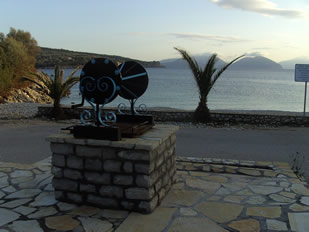 |
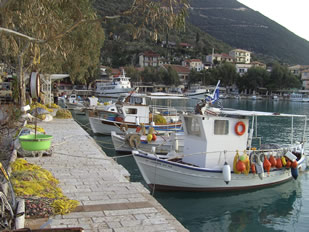 |
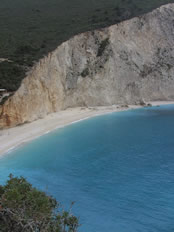 |
|
We go back to Agios Nikitas, where we appreciate a Greek coffee at Captain's corner. We visit Ammouso bay - where we have camped during some of the hottest summer days of the eighties, with friends we had joined: two taverns have been built since that time and the well is now an imposing masterpiece of masonry ... Then that other time we go to Sivota; except for some little fishing boats and three deserted sailing boats, nothing else in the bay. All taverns are closed, some restaurant owners are now fishermen and are busy with their nets. Γεια σου - Yia'sou, hello -, one of them recognising us from our summer stop. When a little S-ly storm - 30 knots at our anemometer - is sweeping the island we return to Vasiliki and to Sivota, and we pass by Mikros Gialos - the beach village of Poros. At Mikros Gailos bay there are heavy seas, big waves are breaking on the beach, stones are smashed on the road. At Sivota the three sailing boats are pulling on their mooring lines, dancing on the serious swell.
In Vasiliki the situation is much better, some pupils are leaving the gymnasium and we, we go to enjoy an excellent Greek coffee at O Livanakis (a mention in the French guide du Routard,for the coffee!).On a nice sunny Sunday we start for a day trip taking our picnic - no open restaurant where we are going! By Exanthia, Hortata et Komilio we drive to
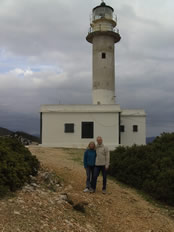 |
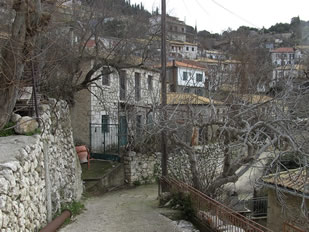 |
In our opinion the E-road from Lefkada to Vasiliki is not so attractive and we don't like Nidri and Vliho but a visit to the waterfalls of Dimosari - on the heights of Nidri - and to Agia Kiriaki - on the peninsula in the east of Vliho bay, are for us certainly worth the detour. Many of our trips bring us at the very nice inland of Lefkas. Many times we pass Exanthia, Hortata and Komilio. But the biggest village of Lefkas, Karia, is with no doubt also worth a visit for its beautiful central square, and Kavalos too, for its small but attractive folk museum. From the road to the high situated radar station at more than 1000 meters we get breath taking views: that day the weather is rather clear and we have a 180 degrees panorama. From Parga till far to the island Kalamos; our view embraced almost the whole Inland Sea. We return by Egklouvi to the little church of Agios Donatos on the pass, and then to Hortata, by this very winding, recently asphalted road. |
When we are crossing the island, what's touching us most is the dominating ash-green colour: here the olive trees determine the landscape and at this month of January the harvest of the olives is fully going on. Anyone living on the island is concerned by the gathering of the olives and the pruning of the trees. Large black nets under the trees show us where the harvest is not finished. Our numerous incursions into the splendid inner part of this island let us forget for a moment the neglected and chaotic aspect of Lefkada town ... The beautiful island Lefkas, rough and authentic, with its so charming inhabitants is still existing!
14.02.09 Lefkas Marina. Eric tells the story...
February seems even more wet and capricious as the two previous months. Every day I note briefly our observations to obtain a rather correct survey about the weather during our wintering. The results are not really nice and the frequently heard reactions of the other winterers are confirming our conclusions. Many of them will not remain here an other winter. But all the same we had the opportunity to enjoy some nice days.
We follow the program of Artiria with attention: so we have the opportunity to hear the Ross Daly Quartet. The very nice music which he offers us that night gets us to forget the horrible rainy Sunday. When we have reached our boat, we still seem to hear the very nice sounds produced by his traditional instruments ...
We fully realize the importance of having (rented) a car. It's only because we have rented it for a longer period that we have obtained a good price with an absolute full insurance When the weather is bad - and this is frequently - we use the car for some shopping too and ... for arriving at our restaurant without being soaking wet! We are little amazed that most of the wintering people - despite some have their own car here - are so scarcely exploring Lefkas; they seem to find this not really being attracting ...
Because of the light being so particular some days, or because, on those days, the weather seems to " allow some hope for a spring-feeling ", we return again to some places. So we re-visit Porto Katsiki, for that light, that day; so we return for the third time to Poros, and also to Vasiliki, and again to Agios Donatos, and to Sivros too, and to Agios Nikitas. Other villages are always on our road: Hortata, Kominio... We also discover places where we never have been before: Agios Ilias, high above Sivros, is not really nice but the view from there is imposing, Alexandros, almost completely deserted in the winter, Platistoma and Kokkino Eglesia and its ruins of the ancient monastery ...
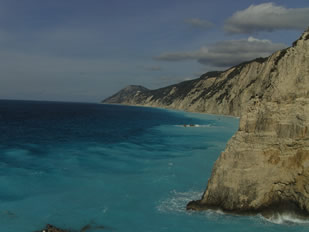 |
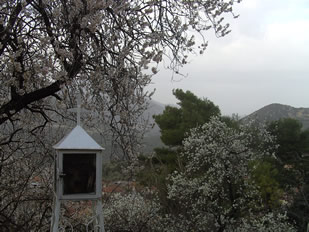 |
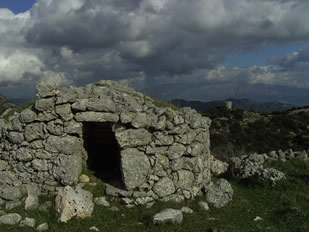 |
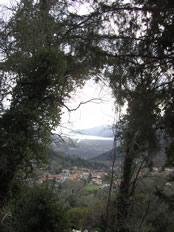 |
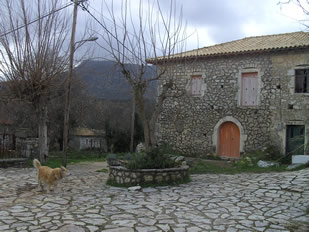 |
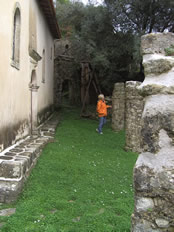 |
At a day of very heavy wind, when the sky is so superb blue, we leave for Sivota-Mourtos and Parga, and go to the north, on the mainland. There we were staying for a long time this summer. Sivota: the shell of the new port is now completely finished and there " should be some hope " for laying lazy lines, so we were told with a certain hesitation! The removable toilets are still there, now well spoiled with graffiti; still no sign of water or power supply.
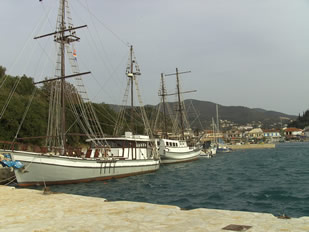 |
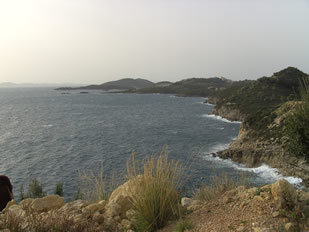 |
Three unoccupied sailing boats seem to winter here, two bigger sailing boats for cruises are getting some maintenance, small fishing boats are moored alongside the quay. At the old quay, where the restaurants are, some sailing boats too, at the wharf side two bigger tripper boats, many small fishing craft. The surrounding gives an almost deserted impression: all restaurants, tavernas and bars are closed. Only a lorry on the way to a building site, breaks the silence. We go for a walk to see how our pleasant summer beach club is at this moment: here too everything is deserted and fully closed. Despite the S-ly wind blows at force 6 to 7, everything seems to be very quiet at Sivota. |
We get a completely different sight at Parga. In the little harbour of Valtos bay it's a real chaos: a tripper boat has sunk, the damages caused by the winter storms are important, the large beach is partly washed away, the harbour seems very silted and numerous terraces of the summer tavernas have been totally destroyed or are seriously deteriorated.
On the remaining small sand strip, in the stream, further on in the groves, between the trees, we see debris, fragments of wood, polyester laminate, nets, and ropes. Chaos! Many small fishing boats are in bad condition. The whole gets a feeling of desolation et we are wondering how this will be cleared for the summer ... In the very picturesque little town - we haven't visit it this summer - some liveliness is visible. We take a seat at the terrace of a bar to enjoy the scenery of the waves which are breaking in a fragmentation of foam. Other visitors too have chosen this café to contemplate the anger of the sea. |
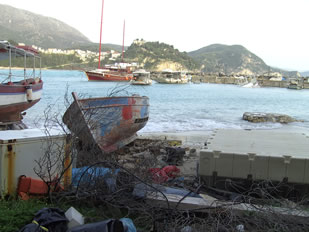 |
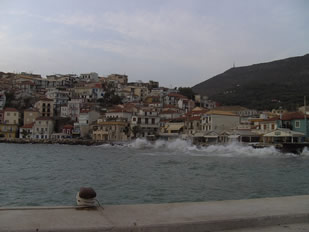 |
|
It's already night when we return at Lefkas after our trip of more than 200 kilometres.
The blossoming of the early fruit trees, the busy harvesting works in the olive groves, the colours of the early flowers - the winter has been rather mild - on the edge of the old mountain paths, the waves breaking on the beach, the foam of the sea splashing on the rocks, the sun capriciously illuminating the marvelous skies of clouds: so many reasons to start exploring ... When we are "in the vicinity " - here the distances are never very long and one is passing always again the same spots - we finish our trip with a visit at Stavros' Old Water Mill-café at Sivros. There we make a choice between our last harvest of images to complete the photo-album of our website.
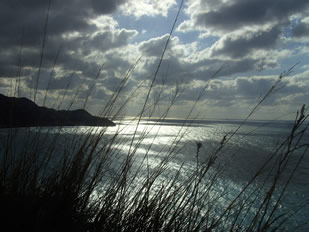 |
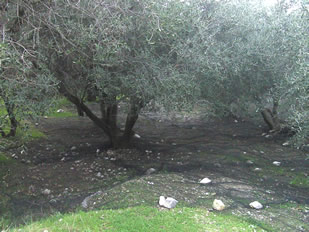 |
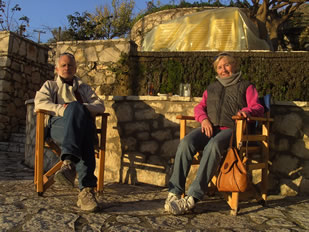 |
The snowy summits confer on Lefkas a quite different appearance. The cold remind that the winter is still there and the grey sky doesn't incite to optimism. Despite all the enthusiasm Kaat is spending to fix a colourful atmosphere, many pictures are too dark ... Again our tour brings us by Karia, then we continue to Egklouvi, which should be the highest village of the island. During our exploration we are struck by the important number of ruined houses here. Taking the narrow road to Nidri we first arrive at Vafkeri. The new restored houses and the nice recently built villas ( to rent ) are predominant in the landscape. From here the view on Nidri and the Inland Sea is magnificent, making from this area a selected site for foreigners and investors. A few little squares nicely organized give Vafkeri a bit more tidy look ...
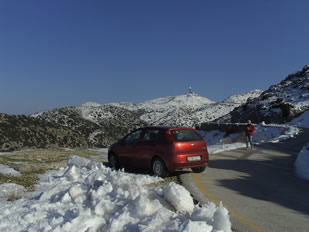 |
|
1.03.09 Lefkas Marina. During the last week of February the snow arrived: not only on the highest summits of the island but also in the numerous villages of the heights of Lefkas the snow was remaining. The north and east winds have brought a serious coldness: so a last rainy day, before we got a period of dry weather, had covert the mountains of Lefkas by a large snow cloth. Alternation of early spring in the valleys and hard winter on the heights, we liked this variation during our trips, finding the spring in the warm sunshine at Milos beach near Agios Nikitas, and the winter wanting to be undefeated on the road from Agios Donatos to Sivros, when suddenly we had to return, the road being unclear and icy! |
But today it's the first day of the meteorological spring and whole Greece is feasting carnival In the main street of Lefkada the carnival parade will start in the late afternoon; since two weeks fairy lights and music - and bangers - are creating the atmosphere. Tomorrow is a bank holiday: so many people came for the weekend to Lefkas. The little town is very busy. Although we don't want to miss anything of the festivities we are preparing our long trip with the car: we want to cross the Greek mainland to the Aegean Sea. |
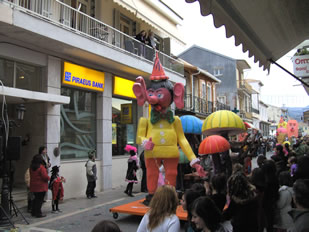 |
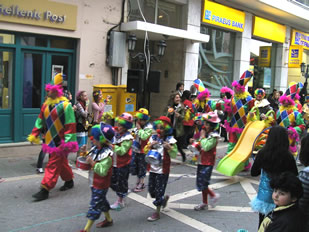 |
Our cross over the Greek mainland, by Metsovon and the Meteora, to the Pilion and Horto.
 |
Lefkada-Preveza-Ioannina-Dodoni-Ioanina-Perama-Ioannina-Metsovon-Kalambaka-Kastraki Meteora-Trikala-Larissa-Volos-Afissos-Horto-Volos-Lamia- Amfissa-Itea-Nafpaktos-Agrinio-Amfiochia-Vonitsa-Lefkada. The photos of our trip from the photo album? Click here! Our stops: Perama, Metsovon, Kastraki near Kalambaka and Horto-Milina. Our visits: the Ancient site of Dodoni***, the cave of Perama**, Ioannina* ( the old town *, the Citadel** the Lake Promenade and Tour ** ), the mountain village of Metsovon** ( Agios Nikolaos Monastiri* and the House of Baron Tossitsa** ), the Meteora and the monasteries ***, the Pilion*** ( our trips in the Pilion: 1*** Horto-Milina-Lafkos-Trikeri-Agia Kiriaki-Milina-Horto; 2*** Horto-Argalasti-Neohori-Milies-Lambihou-Lambihou beach-Tsangarada-Milopotamos beach-Argalasti-Horto; 3** Horto-Milina-Lafkos-Platania-Kastri-Katigiorgis-Mortia-Promiri-Lafkos-Milina-Horto; 4*** Horto-Milina-Zasteni-Kotes-Trikeri-Agia Kiriaki-Milina-Horto; 5* Horto-Argalasti-Xinovrisi-Potistika beach-Melani beach-Paltsi beach-Xinovrisi-Argalasti-Kalamos-Horto; 6** Milina-Lafkos-Milina by the kalderimi - the old donkey path ) |
We leave Lefkas on Monday the 2nd of March heading for Ioannina. Many people on the road because it's a bank holiday for the Greeks. Between Filipiada and Kopani we follow the nice but narrow valley of the Louros: the river runs at our right and the melting of the snow has swelled the at times wild Louros. On the ring road of Ioannina the traffic coming from the east e.g. from the mountain village of Metsovon, is going step by step: for the Athenians - in that large city region three million inhabitants are living from the eleven million Greece counts! - this itinerary is almost the only possibility to return from the mountainous regions of the east of the country. We are on the road to the ancient site of Dodoni*** , 20 km SW from here by the old road, following the motorway it's only half distance.
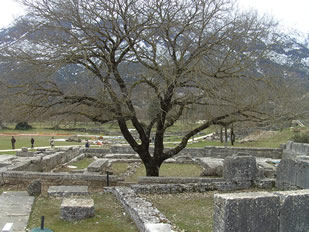 |
Dodoni is the most ancient sanctuary consecrated to Zeus: here the oracle was pronounced under an oak tree and the site became an important religious centre. Many temples were erected here and constructions for the cult too, but also a theatre for about 17000 to 18000 people, larger than the theatre of Epidavros! The University of Ioannina is still continuing excavations on the whole site. [ To read more about Dodoni, click here ] In the afternoon we go to Pérama to visit the cave** (www.spilaio-perama.gr). The guided visit takes about 45'. Passing by narrow corridors, chimneys and stairs we reach splendid underground rooms and cathedrals. The whole cave is well lighted and, according to us, easily accessible. Some visitors get some problems due to the high humidity level - 100% in the winter, 80% in the summer - and the physical efforts in fact very limited!. When we leave the cave the first raindrops are falling... |
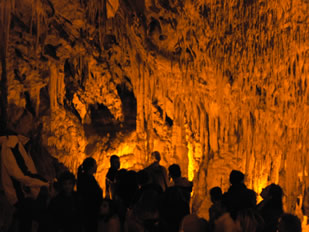 |
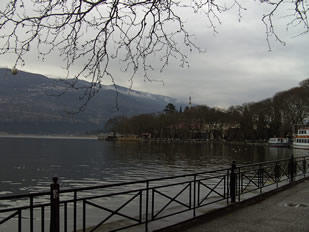 |
We find easily a room, simple but correct at Tsironis* who's running a souvenirs shop near the entrance of the cave. Normally here there is no lack of rooms! While it's raining heavily we return to Ioannina* for a brief reconnaissance: by the promenade** along the lake and the ancient walls, we arrive at the citadel ** : the mosque of Aslan Pacha, the inside fortress with the mosque of Fetiye and the ancient seraglio of Ali Pacha - actually the Byzantine Museum - give the city a undeniable oriental touch, which is not displeasing us!. Unfortunately the small streets very seem deserted by this sad weather when only a few hundred meters from here a lively reign in cafes near the lake. Back in Perama, we eat very well at O Stratos*. |
Tuesday the 3th of March. The motorway Thessaloniki-Igoumenitsa is not yet completed. Between Ioannina and Metsovon; many large bridges, among others, are under construction. After following the old road for a while we decide to take the already completed motorway sections and the temporary deviations, we believe this is faster and more secure - but certainly not so beautiful. There is still much snow and the narrow very winding road, doesn't inspire us to much confidence.
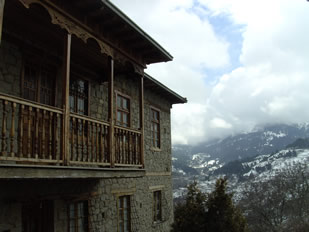 |
Last week - until yesterday - there were a lot of people at Metsovon** but now, without any problem we find a room at Ioannis Charalabopoulos*, on the right of the church. The typical style of the houses, a little dark, and the cleanliness make us forget for a moment that we are in Greece. But the visit to the monastery of Agios Nikolaos* under the vigilant eye of the monk-guide, somewhat gruff, reminds us where we are. We will also limit ourselves to take photos only outside the monastery. In the afternoon it started to rain so we visit the house of Baron Tossitsa **, a magnificent traditional patrician house converted into a museum. |
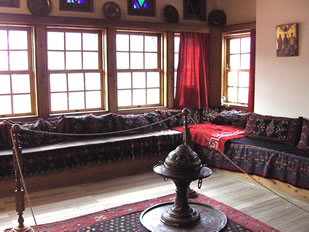 |
Wednesday the 4th of March. From Metsovon to the Meteora near Kalambaka:a nice trip with very sunny weather. Passing the Katara pass (1690 m) we think being in the Alps
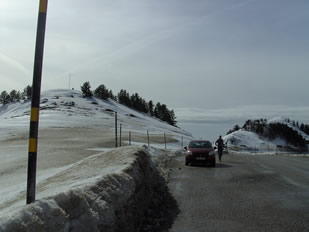 |
seeing those magnificent snowy summits, this road opened by the snowploughs and the skiing runs. This is not what one usually expect to see in Greece! When an hour later we arrive in Kalambaka we are undoubtedly well again in Greece ... This so particularly untidy neglect, takes us back to reality. We look in vain for our small hotel Romantica of 1980 and 1992: it was razed. As we sensed its disappearance we planned to take a room at the beautiful Doupiani House*** in Kastraki. We planned to revisit some monasteries, but our choice is limited by the hours and days of closure, because we are out of tourist season. Upon arrival on site we can still visit the monastery of Varlaam (1350), the nunnery of Agios Stefanos being open in the afternoon. It seems to us that since our previous visits a lot of work for the restoration and embellishing - tourism oblige! - were performed. But, however, the beauty of the site, extraordinarily surprising, affects us again. |
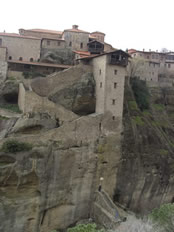 |
In late afternoon we walk in the old village of Kastraki and to two smaller monasteries, built in the rock: they really seem to be part of it. When late in the evening, we leave one of the few open restaurants to join Doupiani House, the first big drops of rain are falling. We really were lucky today because all night it rained very hard ...[ to read more about the Meteora, click here ]
Thursday 5th of March. When arriving at Trikala rain stopped falling. At our departure from the hotel that morning it was raining so hard that we couldn't see the Meteora anymore.. On the road from Trikala to Larissa enlargement works are underway: the old road with two carriageways is now a beautiful four-lane road, which we use in several sections.It's mainly where bridges are being built that we detect little activity - if any at all! - and that we have to use the old two band road, so boring and of sad memory. On some parts under construction lampposts have been installed, while there is no trace of.. coating the carriageways . Has anyone taken advantage of such a fine example of planning? To reach the highway from Thessaloniki to Athens - that we take to the road junction for the express road to Volos - we pass by the outskirts of Larissa, sad and disordered. But finally the bright interval is confirmed: a beautiful sun but a strong southerly wind welcome us at the entry of Volos.
The crossing of the town is slow, traffic is very dense and there are many traffic lights. Signs clearly indicate the way towards the Pilion and Argalasti.
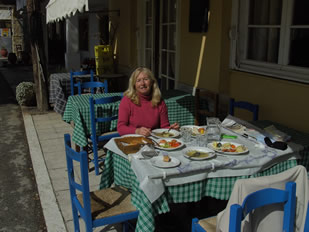 |
Half an hour later we drive alongside the sea: the Aegean Sea! The beautiful mountain Pilion and more south the mountain of Trikeri surround the pleasant Pagasitikos Gulf, a real inland sea: at the south side a relatively narrow passage opens onto the open sea between the mainland and the large island of Evia. At 13H we are at Afissos, a charming village on the west coast of the Pilion. At the terrace of one of the rare open tavernas , we were served a fish soup and a Greek salad. Sheltered from the rather cold wind we enjoyed very much this simple meal. On the road to Argalasti we see the devastating consequences of severe fires that have affected the Pilion in 2007. The abundant vegetation, often rich and varied, was gone at many places, the flames finding an easy prey on it. We remember these beautiful hills that we both had enjoyed during our first visit in 1992... In this large village of Argalasti without a real character, we take the capricious road that is winding down to the sea. |
Horto. Here, in front of us the little village is almost like we left it at the end of August 1994. Few new buildings. We feel the same charm as before... The goal of our entire trip is here: it will be, fifteen years later, the so long expected destination for this summer (our feelings about this reunion excuse, we hope, this somewhat grandiose term)!
Years ago we already didn't like Milina and after one night in a room which we enjoyed very moderately we switched for a very nice mini-apartment , with a breathtaking view, at Horto. The view and the quality/price ratio of the room above the restaurant O Sakis (at Milina) - where we had a not so bad meal last night - seemed us to poor, we couldn't take breakfast before 10 a.m. and we had no opportunity to prepare something ourselves. In our Guide du Routard we then found the phone number of France-Marie. She's living here for over forty years and holds the Casablanca café***, where also small meals are served. The café is above all a particularly pleasant meeting place. From this charming and welcoming lady we collect much useful information! She briefed us about the beautiful Melies-appartments.
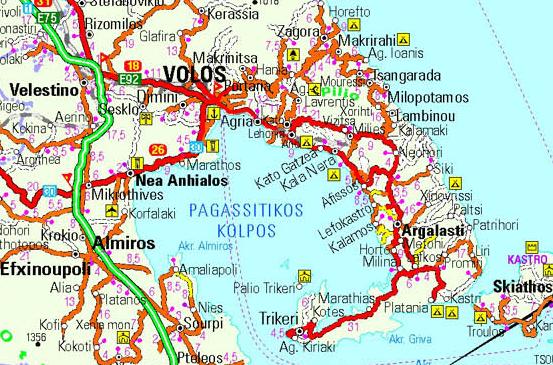 |
Short return in the past to our last stay in Horto, fifteen years ago. The Hotel Spaladra still exists but is closed till the summer season. We meet again Niko and Georgina, the owners: she recognizes us after ten seconds, Niko needs a little more time - he's now 83 - but then everything comes back ... the sails of the windsurfing boards stored in the large restaurant, the fishing trips to catch squid at night, our Zodiac, on its mooring (Niko winched a heavy stone for it whit his boat) in front of the hotel ... we are also looking for Spiro, who lives a little further into the village and who was working for a long time in Belgium.
|
||||||
[map: GNTO] It's always the joy of the reunion: the drinks, the biscuits and the homemade glyka served as a sign of hospitality and welcome.But we have to re-explore everything again. Not only because we want to explore possibilities for our stay with the boat this summer: we also want to know if and how the Pilion has changed meanwhile. As we have a car, we can move easily, the heat of summer and the relatively limited opportunities for public transport would make later recognition as we understand it, impossible. |
Trip 1 Friday. Sun and clouds, yellow mist and fog (dust sand current S), rain in the late afternoon; Horto: ongoing construction of the new bridge should be completed by the summer We take the deviation by the small temporary bridge and drive to Lafkos where we take fuel because there is not any more a fuel station in Milina (two other stations:one in Argalasti and one in Trikeri) - Milina: dusty as always, the camping is still there and also a small harbour in U built and finished(!) recently(poss. water) where a few small fishing boats are moored. A little further Sunsail has installed a wooden pontoon with water and electricity, we ask information: when the Sunsail boats left location, possibility of mooring at
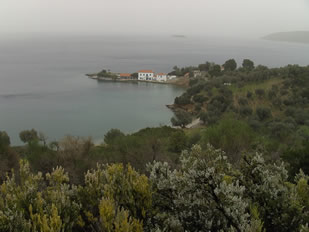 |
the pontoon; taverns are still there, the disco seems to have disappeared - Zasteni: the beautiful little bay with the white house, seen from the road the beach seems quite dirty, renovations in progress at the white house and outbuildings - Trikeri - Agia Kiriaki: strong winds from S, the place is quite unchanged, still charming despite this dark day - Trikeri - brief visit to this fairly large village, 30 km from Milina because it starts to rain very hard - and return to Milina and Lafkos: heavy clouds, heavy rain, mud on the road - Horto: dry in the evening and easing wind, we have a good dinner at Marta's estatorio - open for the weekend -, located on the beach, at a five minutes walk. |
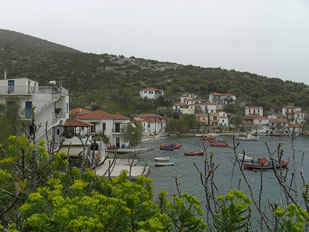 |
Today we have noted three major changes: the disappearance of the service station at Milina (delivery possible by mini-tanker from Argalasti and Lafkos), the road to Milina, Trikeri and Agia Kiriaki has been expanded and is now completely asphalted, but also a new road, direct to Agia Kiriaki - the junction is located on the left just before arriving at the end of the bay of Kotes - over the hill and then down to the sea by the S of the mountain Trikeri (large parking place E of port).
Trip 2. Saturday, sunny weather. Horto - Argalasti, market day, we want to buy fruit and honey - Neohori - Milies, a beautiful village on the heights, a mountain village of Pilion, we take one of the old stone paths to the church from where we have a splendid view over the mountains and the Gulf - Lambihou bay & beach picnic on this beautiful beach, we enjoy the nice weather (of course there is a tavern, but it is still closed), Kaat is talking a little with a swimmer, a brave but not so quite young man who comes every day to practice his swim exercise - Lambihou, in the small restaurant we drink coffee and learn that the plane tree in the centre of the place is 850 year old - Tsangarada - Milopotamos beach, according our guide one of the most beautiful beaches and the most sent postcard from the Pilion: very nice, no doubt, but hyper-busy in season! - Argalasti - Horto.
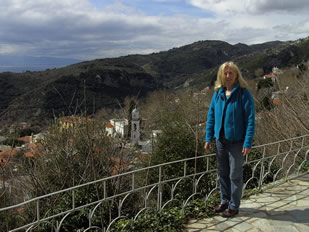 |
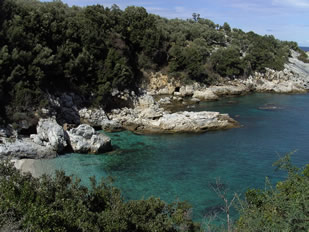 |
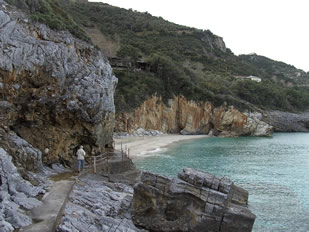 |
Trip 3 Sunday, the nice weather remains; Horto - Milina - Lafkos, although many foreigners have bought a house and live here all year long, the village seems fairly deserted this morning, apart from some workers who bustle about redoing the surface of the village square - it's so pleasant in summer - in natural stone, and from some open kafenions we hear loud voices of men - Platania is the small fishing port where in 1994 we took the Flying Dolfin-ferry to the island of Skiatos for a brief sailing holiday with friends. The ferry service doesn't exist anymore - the island now is reached only by ferry from Volos and Agios Konstantinos -; from Platania to the island there are only excursion boats during the tourist season. We note that apart from the visible consequences of heavy winter weather, the past years have left their marks here: the village and its small harbour have suffered a bit: the quay almost new in 1994, had some damage - Kastri, a beautiful bay, a small hotel closed now, a camping site at the small beach and a tavern, a few holiday houses deeper on and on the hills, a nice villa on top, overlooking the sea. - Katigiorgis, a lovely (small) port with a quay; in the only open estatorio, the last at the beach, we taste - at the sunny terrace -
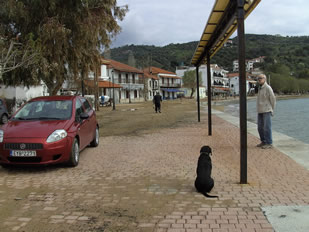 |
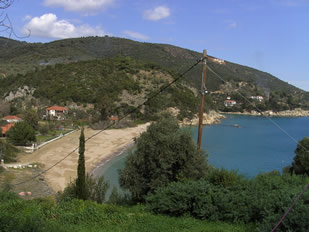 |
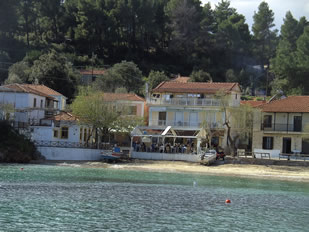 |
of the different fish meze and a few grilled sardines. There is almost no wind and the sun of spring is nice. All tables are occupied because it's Sunday and the Volosians left the city for the mountains and the beaches of the Pilion. They will spend a large part of the day at the table of one of the many restaurants, sacrificing in this particular Greek ritual of receiving friends at the restaurant - a place of conviviality par excellence - rather than at home! - Mortia - Promiri, a pleasant mountain village offering a beautiful view over the Aegean Sea - Lafkos - Milina - Horto. In the evening we take a light and simple meal at Argalasti, in one of the few restaurants serving on Sunday evening.
Trip 4 Horto - Milina - Zasteni. Monday, as the weather is nice we go to this little beach where we went for innumerable times by our Zodiac. The beach is really dirty and cluttered by debris and plastics of all kinds - consequence probably from the winter weather, but we also remind that when we arrived in the beginning of our summer holidays, we first started by cleaning the beach ... In the on the NW open bay a small boat - like ours - can anchor while having this pleasant view to the beautiful white house, under the strict condition keeping an eye at the weather forecast. A young Greek couple arrives and jumps without hesitation in this water that's inviting for swimming ...
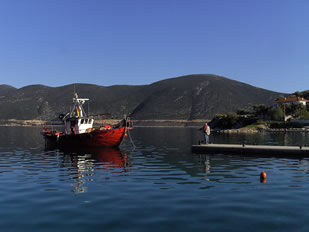 |
Kotes. We were only a few times here; the bay of Kites enters deep in the peninsula. By the program for 2000-2006 a small harbour was built - by European subventions up to 75%. In this mini-village, which has not the sweet charm of Horton, but that in summertime shouldn't miss some real appeal, there are some (more!) taverns now. According to the pilot of R. Heikll strong N winds could cause problems, but in the opinion of our host at Horton, a retired merchant marine captain, the new harbour would be always secure, particularly at its W side - Trikeri, it's nice weather (at the opposite at our previous visit) and we start to (re-)explore this fairly large village. From the high situated village and church square the view on the island Evia and the continent is impressive- Agia Kiriaki. Before returning to Horto we take the new very nice - although breathtaking - road to thisfishing village, with permanent view on Evia, after crossing the pass. It's just after sunset but red brightness is still colouring the grey blue sky when Kaat is taking her latest pictures before we drive back. |
In the evening we are at France's Casablanca Café, in the interesting company of two German women spending a week holiday at the Pilion while conducting explorations about the rich flora of this region: their purpose is to explore the possibilities of organizing training courses on wild plants (www.wildkraeuter-gastlichkeit.de & www.seebawell.de). Already the next day, Kaat has a (renewed) interest for what grows and thrives here, remembering the time she composed a herbarium with Olivier.
Trip 5* Horto - Argalasti - Xinovrisi - Potistika beach - Melani beach - Paltsi beach - Xinovrisi - Argalasti - Kalamos - Horto. Tuesday. We visit the beaches where we were frequently in the past for their big waves and for the pleasure of diving into their white foam. Today too the wind is blowing onto the beaches and the waves are breaking in a glittering of white foam, of blue and grey-white water, with mirror and light effects. The sun and light clouds around the summit of Mount Pilion (1651m) also create beautiful contrasts. Visit late in the day at the village of Kalamos, quite desert.
Trip 6** Horto - Milina - Lafkos - Milina - Horto. Wednesday. Our last day in the Pilion. Pleasant morning, spent on our terrace and around the small pier, enjoying a somewhat stingy sun. This afternoon - increasing clouds and tomorrow for our return to Lefkas, rain, says the forecast - we make the pedestrian round promenade from Milina to Lafkos. There are two routes well marked and are shown as route A and B by buttons in yellow plastic, clearly visible, mainly on electricity poles. We take the first route A, left at the end of the street in the wake of the main pier of Milina, where we left the car.
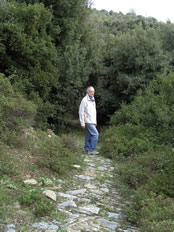 |
The ancient stone path - kalderimi, so we read in the Routard - turns into the hill and 45 minutes later we reach the bottom of Lafkos. No one living soul. The Museum of Radio (?!) indicated many times in the village is closed (d summer ev.days 10-12 a.m. & 6-8 p.m., otherwise only holidays & weekends, same hours). By the small streets we reach the village centre: two older man are talking on a bench, a merchant of fruit and vegetables doesn't seem to be really waiting for the customers. It's already 4 p.m. and the kafenion is still closed: it's not here that we will get served a delicious coffee and more, the clouds are beginning to be threatening. We have to return. We now follow the path B, which passes more southerly. Many parts of this old donkey path road have been rebuilt - again European subventions!. |
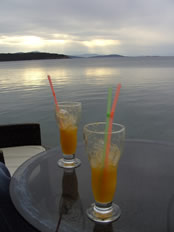 |
Alternation of passages through dense vegetation, with beautiful olive trees of a few hundred years age, and little parts along the road. In less than an hour we are back in Milina. A bright interval appears, so, time to enjoy a fresh orange juice at the terrace of a café on the quay.
France has prepared a delicious dinner and invited her neighbour, a very nice and exciting Englishman. We enjoy very much the soufflé de courgettes au saumon - zucchini soufflé with salmon -, the mushrooms in warm salad, the roasted gigot d'agneau - lamb leg - with slices of in the oven browned potatoes, a nicely flavoured green curly lettuce; as a dessert surprise, a lukewarm banana with orange slices, Cointreau and whipped cream with traces of melted chocolate. The red wine and a small glass of tsiporo make from this meeting dinner a real feast!
12.03.09. Thursday, 08.50 a.m. Back to Lefkas and our boat! A trip of 500 km. The forecast wasn't wrong: dark grey sky, black clouds, heavy rain. We leave the Pilion. The villages where we passed in fine weather have now a quite different appearance. The water that spurts when the car goes through puddles that we can not avoid, the grey-black sky, . everything seems dull, muddy. in Volos traffic is again very dense. We take the road to Mikrothives - 26 km further to the SW - where we join the Thessaloniki-Athens motorway to Avlaki (dir. Lamia) 1,80 euro. After Lamia we have to cross the mountains to reach Itea and Nafpaktos. The road is good but we are not quite alone on the way because it's to the Gulf of Corinth and Patras that we are heading. At Itea we make a break to have a look at the "new" port-without-connected-equipment (what a mess!) and to drink a coffee. At 2.30 p.m. we are at Eratini were we have a good but simple meal, at the small Balianos tavern - calamares, especially fried gluten free (thank you!) and a choriatiki - a Greek salad. Arriving at Nafpaktos, we see at a distance the new Rio-Antirio bridge, a rather heavy construction, without much elegance - we are far from the elegance of Millau!, Kaat says in a final sentence. We go further by the road of Agrinio:an error, because the new stretch of the motorway to Ioannina indicated on the Michelin map doesn't exist yet, despite the huge signs announcing what finally seems to be an embryonic project! We could have known it and had to take the coastal road by Astakos. To late now. So we follow the direction of Amfiocha on this very busy road, unpleasant, and crossing a particularly poor landscape. From Amfiocha to Vonitsa the surface of the road is in poor condition and on the edges, debris and rubbish are (re)appearing. Again! Violent contrast compared with what we have seen before, especially at the Pilion. At 6 p.m.we park the car at the marina. It's still raining heavily...
For data about our trip click here Kortom 4.9.2
More pictures of this trip? Click here!
=> we write: the Pilion, for the region ==> road maps of the free-download site of the Greek National Tourism Organisation GNTO.
Spring
17.03.09 Lefkas Marina. Tuesday. We get up very early: the day promises to be somewhat stressful as always when our boat has to be taken out for careening. People are reassuring us: the marina staff knows the job well. But our boat is not so easy to be taken out! We will never forget it: ten years ago, when the boat was in the straps, they suddenly began to slide! Fortunately more fear than harm. Since that time we ask to connect the two straps by a rope so that they cannot separate, our boat being too small for the width of
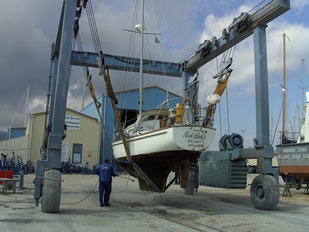 |
most gates. As a matter of common sense, this is done without discussion or problem. Here we need more persuasion, even a sketch! Misplaced pride that feels a challenge of knowledge? Finally we argue that in Belgium, in the Netherlands, in France, in Italy the people are no less capable, no more stupid than in Greece. That it's the experience that dictates ... They do not understand us and feel badly injured. For an Englishman who by far has followed the discussion this is a matter of common sense, which should not tolerate any objection.... Finally the security giving rope appears. The boat will eventually be taken out of the water without (other) problems ... an hour later than planned. When washing the hull with the high pressure a part of the painting of the waterline is coming off. This will require additional work to prepare the boat, a hitch because from Friday the weather will be particularly unstable and very wet! Eric had some latent problems with joints and back so we want to take no risks. Rather than paying a hypothetical medical treatment we have chosen to require the services of Paleros. They will also see to the small retouching paint, provisionally, before the more fundamental curing of this little but too recurring problem next spring. |
As we can not have the room we have reserved during the works before the late afternoon we go to Nidri. We ordered at Phil Steel's workshop - whose reputation for its good work on stainless is well known in the local British community - a small container for the back anchor line, for setting on the pushpit. A detour by Vafkeri allows us to see the progress of works at the restaurant a nice couple of English will open very soon. They have already done quite a job and we are in admiration at the result.
21.03.09 Lefkas Marina. Yesterday morning we relaunched the boat into water, not unsatisfied of the work of Paleros Yacht service. There was no loss of time and the boat was able to regain its berth just before the wind was freshening. When we left the travellift we noted a S wind of 20 kts, a quarter of an hour later the anemometer indicated already 25 kts. When in the evening and during the night the wind was increasing to 36 knots, when torrential rain was slamming on deck, when the lightning was illuminating the sky and thunder was not doing without keeping us awake, we understood that this first day of spring - and the the two following days! - was joining the gallery of the lost illusions ...
Kaat began the transfer of data to update the very useful and good Pilot of Nicolas D. Elias - a quality work for the great amount of nautical information involving the various aspects of navigation - that we have acquired for the coming trip. In our inventory of boat maintenance work in the beginning of the season we can fortunately already note some important finished tasks: Eric had finished the maintenance works on the engine before our departure to the Pilion, and during the three (!) days of good weather that preceded the careening of the boat, we could treat the teak deck, the hood and cockpit tent. We note that for this work which requires a period of dry weather, the weather comfort is as relative as in Nieuwpoort. We had expected to enjoy a period of nice weather as it was last year in Menton: sadly ... it is not. We have really to deal with the coldness, the rain and the wind!
25.03.09 Lefkas Marina. Independence day. Greece is celebrating the liberation of the Turkish domination. Although the Greeks have undoubtedly cruelly suffered under the four century long occupation, we still have some difficulties to get used to the feelings strongly nationalist perennials in the country which sometimes appear in a surprising way. This country that is not able to organise an education of quality - nor even acceptable, according to some ones! -, that gets the serious well known socioeconomic problems, has for evident complex reasons, a military tradition that is heavily weighing on public finance. We are not alone - as European co-citizens! - to feel some difficulties about that aspect of the Greek society: through many conversations with other foreigners it appears as irritating. But fortunately we detect by the younger generation a doubt that looks like an attitude to deride the political choices of their country... however, often, that criticism should not come from a non-Greek!
At 10 a.m. we have an other brief but heavy thunderstorm. Again huge amounts of rain are falling out of a very dark sky. Boats are heeling over under the the violent gusts, we note SW 36 kts. Then a sunny break appears. We hurry towards the square between the Hotel Lefkas and the bridge, where the ceremony will take place. At the Monument a brief
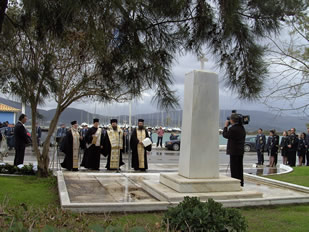 |
religious ceremony is going on. The deep voices and the songs of the metropolitan (Greek-orthodox . bishop) of Lefkas and his co-celebrants resound through the speakers. A small military task and the fanfare give a salute in the presence of the local civil, religious and military authorities. . Again the sky is threatening but the wind is pushing the rain to the continent. At the Promenade along the N-lagoon about two hundred pupils of the local primary and secondary schools are waiting for the start of the parade passing the honour platform - numb with cold in their white shirts and blue trousers or skirt. Fortunately the rain is not coming. After the religious commemoration, the parade starts. |
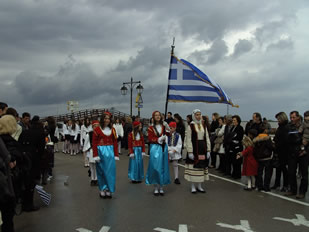 |
In the lead the fanfare, then the bearer of the flag with her companions in traditional dress. Then the primary school pupils and the secondary school pupils. Their salute to the flag of every delegation leader is amazing us. we are disconcerted seeing the right arm, forward raised with the straight palm, some with raised fist ... one is reassuring us. Clapping at the platform and by the public. Then still other participants in traditional dress. The military task is marching past. Applause, by many onlookers. Here are the firefighters with their three cars closing the parade. clapping, again. It's finished. The public is dispersing towards the centre of the city, the cafés are stormed. We'll take a fresh orange juice at a terrace of the main square - the Plateia ... an hour later, it's raining again.
05.04.09 Lefkas Marina.The feeling of an early spring - although very fragile, is more sensitive. It was a little more warmer the last days, and above all, the rain stopped - for some time? Now we are living on the rhythm of the summertime. Since the 1st of April the marina is applying the "high season" rates. Now that the first tourist sailors are arriving and that the charter boats are coming back to their berths, many wintering people are leaving the harbour, some with specific plans - Croatia or Turkey, Malta, or Sweden, going back home -, other ones have already gone to Preveza where the costs of careening are not so expensive, still other ones went to the anchorages in Vliho or Tranquil Bay. We are finishing our list of preparing the boat. Olivier is coming during the Easter holidays for about ten days and we plan some sailings in the Inland Sea.
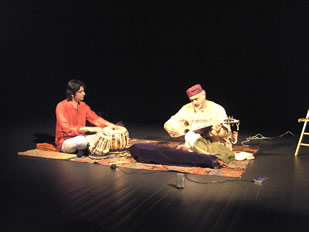 |
|
|
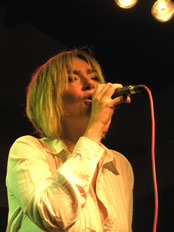 |
In the cultural centre Artiria there was a well filled program. Again we were at two unforgettable concerts of Ross Daly (www.rossdalymusic.com): by this " I dromi tis Anatolis sta monopatia tis Dysis" the very beautiful instruments produced this music from the Orient that lets dream: one night by the rhythms of tambourines by Zohar Fresco, the other night it was the ancient music of Afganistan by Daud Khan Sadozathat nourishing our imagination. Yesterday night an other nice event: the concert of Rita Antonopoulou - a well known singer in Greece -: she was bringing the songs of her latest CD "Pame xana ap' tin archi". With her four musicians she filled the packed full auditorium in the first part with rock sounds, in the second part with nice tragoudia that the audience resumed in chorus, as it was at the concert of ChristosThivaios. She got a thundering applause singing at the end of the concert - it was at that moment almost 2 o'clock in the night - the very popular Eleni, by Thanos Mikroutsikos...
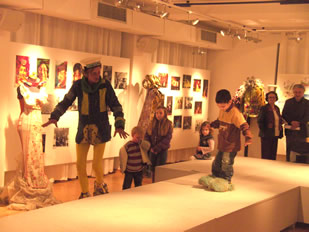 |
This night, and for the rest of the week, the travelling entertainers from The Ship of Fools - (www.azart.org) will be at the stage in Artiria. After they left the Netherlands, they made along many countries a long and extravagant trip, full of burlesque events. In September too they have presented at Lefkas - where they have wintered - a comic performance of disconcerting and very particular surrealism ... |
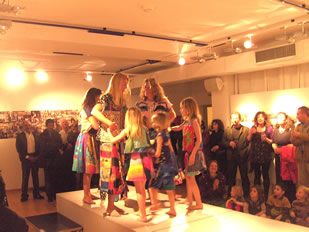 |
In Vafkeri Peter et Alison succeeded in finishing the works for their new restaurant and they have just opened The Katoghi: It's a real adventure and a immense challenge. We saw them hard working this winter, but now it's their restaurant we visit and not the building site! We like this very cosy and nice place: we appreciate Alison Greek cuisine and it seems that we are not the only ones - a real performance providing by her own about more than twenty cover charges!. Peter, who's serving and paying all attention to the guests, is very nice and knows always un bon mot, very British. Our best wishes for making a success of their project!
30.04.09 Lefkas Marina. We will not keep a nice memory of the weather during our wintering at Lefkas island. Grey, cloudy and fresh, steadily rain or showers, thunderstorms, windy. During the visit of our son Olivier and helen luckily the weather was relatively better. Two sailing trips, island re-explorations with the rented car and some sunny beach and farniente days made from their 10-day-stay a very nice period.
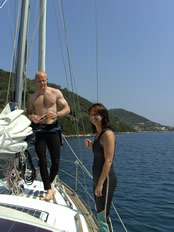 |
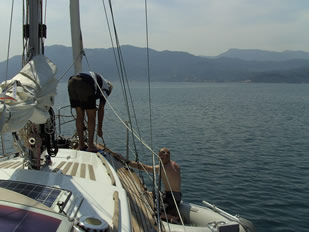 |
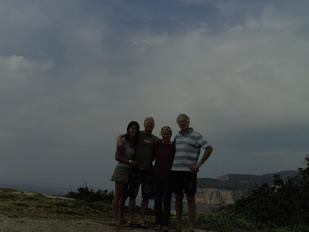 |
After the Greek Easter, Spring was - again - very unstable.
In the marina we see now some new, rather pale faces: sailors just arrived in Greece and having launched their boat after wintering ashore in Preveza. The new sailing season is - although slowly - starting. In town we notice no important touristic arrival. Between 5 and 20% less than last year during the Easter holidays - " due to the world economic crisis "- goes whispered round. But no visible down when we consider the restaurant visits by the Greeks; its rather going the other way! Despite, the fear of a very important decline of tourism from abroad for the Summer, should be very present.
On board we reinstall our cockpit tent to do our varnish works, that we don't want to differ, in a dry environment. In the small house near the lagoon that we rent for the duration of the works - drying varnish is not particularly healthy! - the heating is regularly working to keep away the very uncomfortable humid coolness of this early Spring.
But if the weather is really disappointing, we have some pleasant encounters. So, on the party organized on Greek Easter by our English pontoon neighbours, in their house on the heights of Lefkada - many guests, roasted lamb and suckling-pig -, we meet a nice French couple. They are preparing the boat they have bought here.
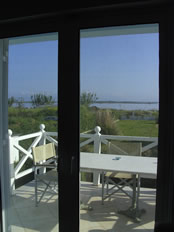 |
|
|
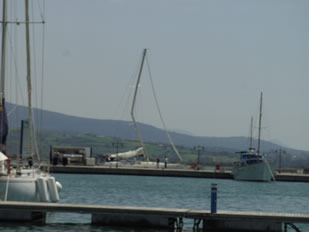 |
After having met them on the pontoon, we spend also a very pleasant evening in our restaurant San Paramythi with Dutch sailors on the way to the Bay of Volos with an Etap 22, they just have trailed by road from Holland to Lefkas .
We expect to meet Niels and Janne from the Concordia, which we met by chance in Rome after we had seen them in Avignon and with whom we reached Corfu. They are just back in Greece, having spent the winter in Denmark, and are preparing their boat in Ermioni, on the NE coast of the Peloponnese, before returning to Barcelona. Wil and Jeanine, a Dutch couple, met on several occasions last summer, just arrived in Preveza where their sailing boat wintered. Rinaldo and Maryse - we hope to meet them this summer - will soon leave Menton for Kos.
Click here for the data in Kortom, 4.9.1
Click here to continue the voyage: 4.2. Greece: the aim of our project, Horto and the Aegean, and the return to Lefkas (2009) Ep6.
Back to the previous page 4.1. 1. Greece: the Ionian, from Corfou to Lefkas and Fiskártho. (2008) Ep5.1
Back to the general overview, click here.
| Top |
The weather during our wintering at the Marina of Lefkas. |
|||||||||||||||||||||||||||||||||||||||||||||||||||
After the thunderstorm of the 15th of September autumn was suddenly there: in the second part of September we had many days of rain mostly with thunderstorms and the weather was generally changeable. October was nice, so we were told, but then we were in Belgium and at Menton at the Côte d'Azur! |
|||||||||||||||||||||||||||||||||||||||||||||||||||
|
|||||||||||||||||||||||||||||||||||||||||||||||||||
HMS( = HNMS - Hellenic National Meteorological Service - RAIN = total rainy days + rainfall in mm; TEMP.= monthly maximum & minimum & average temperature. DAYS WITHOUT RAIN & DAYS WITH RAIN & DAYS WIND>25 kts & TEMPERATURE in degr.C: according to our observations. The temperature was very changing; we note very big differences. February seems to be without doubt the coldest month; we have count 8 really "cold"days: despite it was sunny, the feeling temperature was about 2 degrees C due to the cold NW-ly and E-ly wind, except at midday in the sun! On the mountains of Lefkas and at the higher situated villages - Karia, Egklouvi, Hortata etc. - the snow remained for a week and it was freezing even at midday. 14-nov-19 not really passable! The highest summits at the mainland, visible from Lefkas, were snowy from November. During our trip to Horto (2-12 March) it was raining during 3 half-days and one full day, the rest of the time it was sunny; at Lefkas it was raining 9 days during the same period, we were told, and they had there two sunny and dry days; we felt that March at Lefkas was a very cold month, on the summits it was regularly snowing. In April we got some very nice days - mostly during the first part of the month - although the nights were still very cold; during the last part of April it was many times cloudy and even very cloudy, we got heavy showers, some entire rainy days, and thunderstorms; the weather charts - temperatures and precipitations - were reporting important anomalies for the whole period ( till + 400% for the precipitations ). Overall we felt the weather during the wintering 2008/2009 as unpleasant: the abundant rainfall and the cold - although not unusual here - were considered, in general, as being " not normal". However, this wintering couldn't suffer no comparison at all with our stay at Menton (F) during the winter 2007/2008. About the climate of Lefkas N.D.ELIAS writes (o.c., p.59, see Bibliographie in KORTOM 7): Generally the climate is mild and healthy. It rains continually during winter and the temperature is often below 0 [degree] C but it rarely snows. The temperatures are low during summer as there is a continual alternation between the N and W winds of the land and sea breezes. About the frequent thunderstorms see R.MAYENÇON & R. DELORME, o.c. p. 99 sq; the thunderstorms are developing often at night; the determination factor is the contrast between the high, stable temperature of the water mass - till the largest depths (5100 m! S of Greece) nearly 13 degrees C - and the important variations of the surface temperature. |
|
Click here for the data in Kortom, 4.9.1
Click here to continue the voyage: 4.2. Greece: the aim of our project, Horto and the Aegean, and the return to Lefkas (2009) Ep6.
Back to the previous page 4.1. 1. Greece: the Ionian, from Corfou to Lefkas and Fiskártho. (2008) Ep5.1
Back to the general overview, click here.
| Top |
